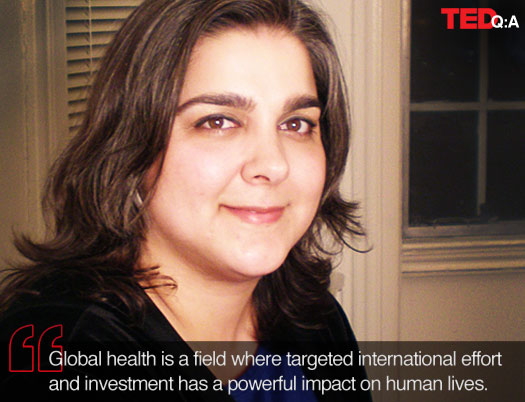In the past decade, we’ve changed the way we collectively view the health of the 7 billion people who occupy this planet. Health issues were once seen as an isolated national or regional problem; now they are a global concern. In What’s Killing Us: A Practical Guide to Understanding Our Biggest Global Health Problems, 2011 TED Senior Fellow and healthcare expert Alanna Shaikh lays out the most important challenges and issues in global wellness – from tuberculosis and HIV/AIDS to flu, maternal mortality, and the diminishing effectiveness of antibiotics – while untangling the web of jargon that so often permeate those discussions. Shaikh, who runs the international development focused-blog Blood and Milk, also provides clear ideas about how these worldwide problems can be managed.
In What’s Killing Us, you concentrate on 10 major health topics. Why just 10?
Because they cover a wide and varied range of health issues. Understanding them will give you the background you need to learn about any global health topic. These are some of the most important issues that the human race is facing, although they’re just the highlights of the many health threats that endanger us.
What are the most promising initiatives you’ve seen to improve global health?
Although it has taken some criticism lately, The Global Fund to Fight AIDS, Tuberculosis and Malaria has elevated global health to a consistent international priority. I am also excited about inviting more people into health care – training community health workers, giving nurses more responsibility, and teaching people to care for their own health. Making good health is everyone’s job, not just the job of physicians. Our new focus on improving health systems is also inspiring. Looking at health and health care in a broader social and national context makes a huge difference.
How real are the threats of a global pandemic?
Our globalized lifestyles mean that there is almost no way to stop infectious diseases from spreading rapidly and internationally. When a very contagious disease crops up, we’re all at risk. We got off easy with swine flu because it was highly contagious but was not all that dangerous once you had it. There is no guarantee the next pandemic will be as benign.
We see a number of philanthropists, Bill Gates among them, devoting a lot of time and cash to improving health. How important are these actions?
Tremendously important. Global health is a field where targeted international effort and investment has a powerful impact on human lives. Many global health problems are things we know how to solve if we just had the funding to do it.
What are the health issues that we should worry about the most in the next five to 10 years?
The two biggest are climate change and tuberculosis. Drug-resistant tuberculosis is the big one. Tuberculosis (TB) is evolving so that our current drugs can’t treat it. TB is also contagious through the air so it spreads in situations like crowded cities and public transport. And climate change will be the biggest single threat to human health, causing everything from famine to natural disasters to new infectious diseases. We should also worry about the growth of non-communicable diseases like cancer, diabetes, and heart disease. Rates of these diseases are rising rapidly. Finally, as the planet urbanizes we need to start make making good, deliberate choices about the design of cities. If cities just grow without any government thought about the health of people in them, it will be a health catastrophe.
What’s Killing Us: A Practical Guide to Understanding Our Biggest Global Health Problems is part of the TED Books series. They are available for the Kindle and Nook, as well as on Apple’s iBookstore.

Comments (1)
Pingback: US Steroids for Sale